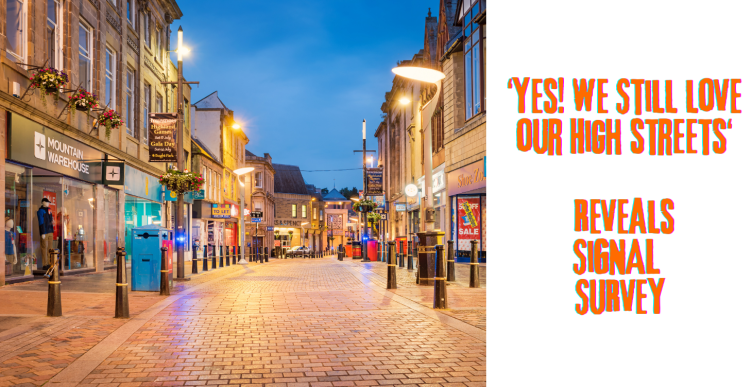REGENERATION
Yes! We Still Love the High Street

‘Yes! We Still Love the High Street’ says SiGNAL survey
In ‘The Rest is Money’ podcast this week, Robert Peston described the decline of the British High Street as ‘one of the most important problems we face as a country’. It seems that few businesses can now survive this challenging retail environment, so something must be done, and quickly. But what?
The British Retail Consortium reported in July that some 6,000 shops have closed down over the past five years, largely due to “crippling business rates and the impact of the Covid lockdowns”. Hospitality, the mainstay of the High Street, has been hit by crippling fuel bills and furthermore, bear the full cost of VAT on supplies. In the current market, VAT has compounded supply price rises by an additional 20% because costs cannot be passed on in the current economic climate.
Just as we thought things couldn’t get any worse for the High Street, 2023 brought with it a shoplifting epidemic on the back of the cost-of-living crisis.
Eight million shoplifting incidents a year are costing retailers one billion pounds in stolen items despite further billions being spent on security. (For example, Co-Op is expecting to lose £70 million to shoplifters this year after spending £200 million in security).
On top of all this, retailers are feeling less and less safe with a resurgence of gangs shoplifting to order. Tesco has reported a 30% increase in violence towards staff and a shocking 90% of corner shop workers have experienced abuse in their shops this year.
In response to the growing crisis the Chair of John Lewis, Dame Sharon White, called for a Royal Commission to look at possible solutions around rates reform and increased security on High Streets.
At SiGNAL we would strongly support this intervention - believing that High Street businesses provide a community hub that is essential for our economic and social well being.
Too impatient to wait for a Royal Commission however, we have commissioned our own SIGNAL survey of 1200 citizens from all across the UK to find out whether they think the British High Street is worth saving - and if so, by what means?
We started by assessing existing sentiment. The results were clear: the British public's love for their local traditional High Street remains as strong as ever, despite the challenges.
An overwhelming 90% of respondents agreed that a vibrant local high street is critical for healthy and connected communities.
Additionally, a staggering 95% expressed the importance of supporting local businesses in their area. These results suggest that while people recognize the value of the high street, and want to visit, they aren’t going because it is currently failing to deliver the desired experience.
What, then, would make us visit High Street shops more regularly?
Almost half of our respondents suggested that they would welcome later opening hours (43%) and the creation of pedestrianised areas* (40%). Simply extending operating hours and implementing car-free zones could create a more convenient and enjoyable shopping experience.
Interestingly our survey reveals that 66% of respondents would be more inclined to shop locally if they were already there for other reasons such as co working, attending in person meetings or going to a private office. People often talk about the integration of retail with the hospitality and entertainment industries - but with the growth of the hybrid working movement the opportunity of a new flex space industry on the High Street shouldn’t be ignored
A robust 81% of survey participants welcomed the idea of integrating office spaces and workspaces into the high street. In fact, 55% expressed a strong willingness to pay to use such spaces, including co-working areas and micro-offices. This presents a significant opportunity to transform empty retail spaces into vibrant, dynamic work environments that cater to the needs of the work near home crowd.
It is evident that in Britain our passion for the high street and local business remains strong. However, to revitalise town centre economies we need to develop an attractive blend of social experience to include culture, leisure and remote work alongside the cafes, bars and restaurants.
People will dwell in town centres for entertainment and social reasons, but also for remote or erntrepreneurial work. Embracing the concept of mixed-use High Streets, where people live, work, shop, and play in the same area, is a real way forward. This approach will provide individuals with compelling reasons to visit and utilize their local high street regularly, contributing to the success of our vital local businesses and fostering a thriving community hub for everyone involved.
SiGNAL is a flexible workspace operator that focuses on community building and creating positive, healthy environments. If you have a town centre retail unit to let and you’d like to discuss ‘SiGNAL on the High Street’ please get in touch HERE
* Unsure about pedestrianisation?
There’s a great article here in The Big Issue about the pros and cons of pedestrianisation in Ljubljana, Slovenia - a city that went fully car free as early as 2007 and is now reaping huge benefits.







